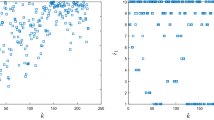Abstract
Gradient methods are famous for their simplicity and low complexity, which attract more and more attention for large scale optimization problems. A good stepsize plays an important role to construct an efficient gradient method. This paper proposes a new framework to generate stepsizes for gradient methods applied to convex quadratic function minimization problems. By adopting different criterions, we propose four new gradient methods. For 2-dimensional unconstrained problems with convex quadratic objective functions, we prove that the new methods either terminate in finite iterations or converge R-superlinearly; for n-dimensional problems, we prove that all the new methods converge R-linearly. Numerical experiments show that the new methods enjoy lower complexity and outperform the existing gradient methods.


Similar content being viewed by others
Notes
For example, in this test problem, the per iteration computational cost of \({\text {ABB}}_{\min }\) is \(n^2+3n+\frac{5}{2}\), while that of Alg. 3 is \(\frac{1}{5}n^2+\frac{2}{5}n+\frac{3}{10}\).
References
Barzilai, J., Borwein, J.M.: Two point step size gradient methods. IMA J. Numer. Anal. 8, 141–148 (1988)
Cauchy, A.: Méthode généerale pour la résolution des systems d’équations simultanées. Comp. Rend. Sci. Paris 25, 46–89 (1847)
Curry, H.B.: The method of steepest descent for nonlinear minimization problems. Q. Appl. Math. 2, 258–261 (1944)
Dai, Y.-H.: Alternate step gradient method. Optimization 52(4–5), 395–415 (2003)
Dai, Y.-H.: A new analysis on the Barzilai–Borwein gradient method. J. Oper. Res. Soc. China 1(2), 187–198 (2013)
Dai, Y.-H., Fletcher, R.: On the asymptotic behaviour of some new gradient methods. Math. Program. 103(3), 541–559 (2005)
Dai, Y.-H., Yuan, Y.-X.: Analysis of monotone gradient methods. J. Ind. Manag. Optim. 1, 181–192 (2005)
Dai, Y.-H., Liao, L.-Z.: \(R\)-linear convergence of the Barzilai and Borwein gradient method. IMA J. Numer. Anal. 22, 1–10 (2002)
De Asmundis, R., di Serafino, D., Riccio, F., Toraldo, G.: On spectral properties of steepest descent methods. IMA J. Numer. Anal. 33(4), 1416–1435 (2013)
De Asmundis, R., di Serafino, D., Hager, W.W., Toraldo, G., Zhang, H.-C.: An efficient gradient method using the Yuan steplength. Comp. Opt. Appl. 59(3), 541–563 (2014)
de Klerk, E., Glineur, F., Taylor, A.B.: On the worst-case complexity of the gradient method with exact linesearch for smooth strongly convex functions. Optim. Lett. 11, 1185–1199 (2017)
di Serafino, D., Ruggiero, V., Toraldo, G., Zanni, L.: On the steplength selection in gradient methods for unconstrained optimization. Appl. Math. Comput. 318, 176–195 (2018)
Fletcher, R.: A limited memory steepest descent method. Math. Program. Ser. A 135, 413–436 (2012)
Frassoldati, G., Zanni, L., Zanghirati, G.: New adaptive stepsize selections in gradient methods. J. Ind. Manag. Optim. 4(2), 299–312 (2008)
Friedlander, A., Martinez, J.M., Molina, B., Raydan, M.: Gradient method with retards and generalizations. SIAM J. Numer. Anal. 36, 275–289 (1999)
Gonzaga, C., Schneider, R.M.: On the steepest descent algorithm for quadratic functions. Comput. Optim. Appl. 63(2), 523–542 (2016)
Nocedal, J., Sartenaer, A., Zhu, C.: On the behavior of the gradient norm in the steepest descent method. Comput. Optim. Appl. 22(1), 5–35 (2002)
Raydan, M.: The Barzilai and Borwein gradient method for the large scale unconstrained minimization problem. SIAM J. Optim. 7, 26–33 (1997)
Raydan, M., Svaiter, B.F.: Relaxed steepest descent and Cauchy–Barzilai–Borwein method. Comput. Optim. Appl. 21, 155–167 (2002)
Vrahatis, M.N., Androulakis, G.S., Lambrinos, J.N., Magoulas, G.D.: A class of gradient unconstrained minimization algorithms with adaptive step-size. J. Comput. Appl. Math. 114(2), 367–386 (2000)
Yuan, Y.-X.: A new stepsize for the steepest descent method. J. Comput. Math. 24(2), 149–156 (2006)
Yuan, Y.-X.: Step-sizes for the gradient method. AMS IP Stud. Adv. Math. 42(2), 785–796 (2008)
Yuan, Y.-X.: A short note on the Q-linear convergence of the steepest descent method. Math. Program. 123, 339–343 (2010)
Yuan, Y.-X.: Gradient methods for large scale convex quadratic functions. In: Wang, Y., Yang, C., Yagola, A.G. (eds.) Optimization and regularization for computational inverse problems and applications, pp. 141–155. Springer, Berlin (2010)
Zheng, Y., Zheng, B.: A new modified Barzilai–Borwein gradient method for the quadratic minimization problem. J. Optim. Theory Appl. 172(1), 179–186 (2017)
Acknowledgements
The authors would like to thank Prof. Ya-xiang Yuan from Chinese Academy of Sciences, the editor and the two anonymous reviewers for their valuable suggestions and comments.
Author information
Authors and Affiliations
Corresponding author
Additional information
Publisher's Note
Springer Nature remains neutral with regard to jurisdictional claims in published maps and institutional affiliations.
This work is partially supported by NSFC Grants 11771056, 91630202 and 11871115, and the Young Elite Scientists Sponsorship Program by CAST 2017QNRC001.
Rights and permissions
About this article
Cite this article
Sun, C., Liu, JP. New stepsizes for the gradient method. Optim Lett 14, 1943–1955 (2020). https://doi.org/10.1007/s11590-019-01512-y
Received:
Accepted:
Published:
Issue Date:
DOI: https://doi.org/10.1007/s11590-019-01512-y



